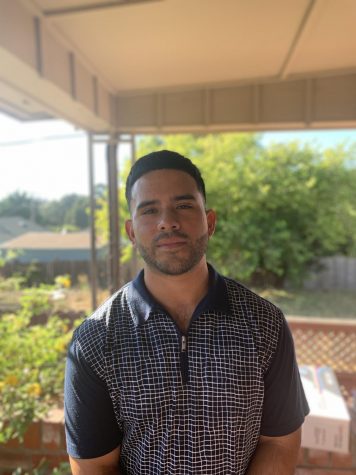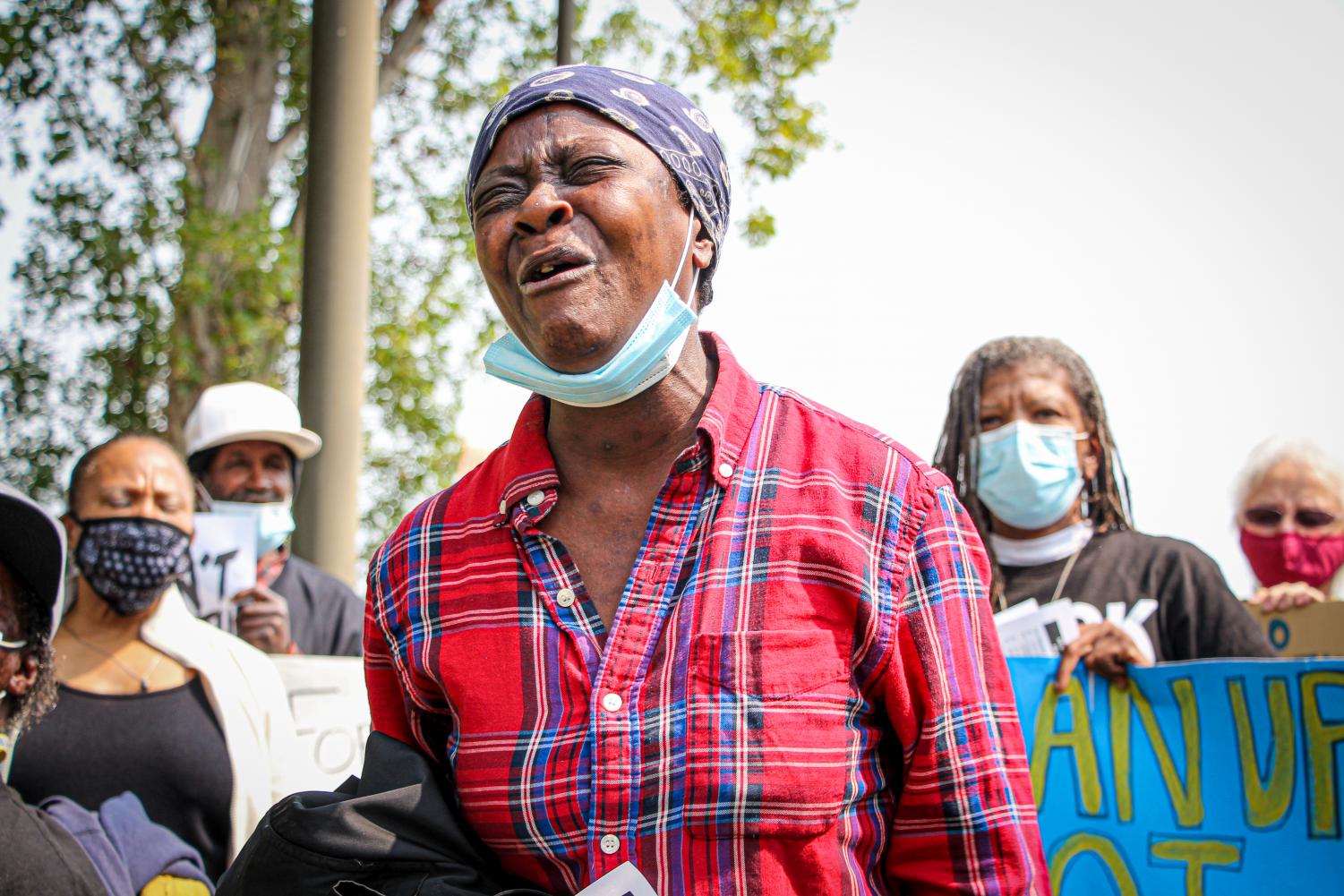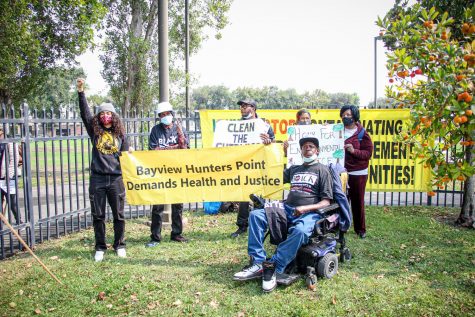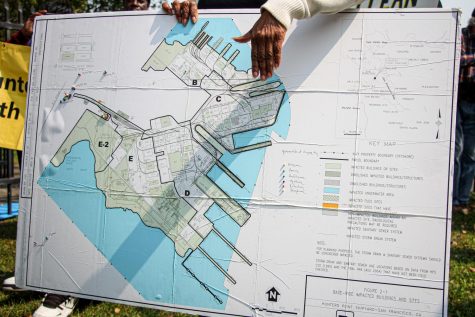



Sep 7, 2020
A group of local residents and environmental activists in Bayview-Hunters Point held a press conference on Sept. 1 calling for accountability of City Hall with a renewed request to reconsider planned housing developments in the neighborhood.
The group, led primarily by members of the Bayview-Hunters Point Mother’s and Father’s Committee, Greenaction for Health and Environmental Justice, held the “We can’t breathe” event at Bayview Park with one primary message for Mayor London Breed, the Board of Supervisors and the Planning Commission: end environmental racism, pollution and displacement in the neighborhood.

The event, initially planned as a protest and car caravan for Aug. 25, was changed to a press conference and community letter of reconsideration due to poor air quality resulting from the ongoing fires by the CZU Lightning Center in San Mateo County and Point Reyes in Marin County, according to Greenaction community outreach organizer Sabrina Hall.
Leaotis Martin, president of the Bayview-Hunters Point Mother’s and Father’s Committee and longtime resident of District 10, said that police brutality and environmental racism –– a concept Greenaction defines on its website as “the disproportionate impact of environmental hazards on people of color” –– have similarities as systemic issues that produce harmful results for Black individuals and other people of color.
“We are already flooded with punitive damages, but they (city officials) are steadily letting Lennar and everybody else do what they want to do,” Martin said. “If we’re already flooded with all this stuff and you keep allowing all these people to keep coming in, it’s bringing more to us. Basically you’re suffocating us, and there’s no difference between that and a bad cop shooting an unarmed black man — or unarmed man. They both are the same because you die and the results are the same.”
Bayview-Hunters Point residents and advocates have long raised concerns over environmental degradation areas of redevelopment such as the 103-unit India Basin mixed-use project and the Lennar development project at the Hunter’s Point shipyard, which is slated to be San Francisco’s largest modern redevelopment project with over 9,000 planned homes. Both sites are located where the U.S. Navy used radioactive material during World War II — turning the areas into superfund sites. According to the Environmental Protection Agency, superfund sites are locations around the country that are contaminated by hazardous material being “dumped, left out in the open, or otherwise improperly managed.” District 10 is home to one of California’s 97 superfund locations, second in the nation behind New Jersey.
According to a study released by the EPA in 2017 focusing on superfund remedial sites, populations living approximately one mile from these sites are 49.3% “minority,” which the study defines as “all race & ethnicity categories except ‘non-Hispanic white.’” In the American Community Survey 5-year estimates for 2014 to 2018, the Bayview-Hunters Point neighborhood was 26% Black, 36% Asian and 25% Latino.
Martin, who has lived in the neighborhood since the 1960s and was brought into the fight for environmental justice by longtime local activists Marie Harrison and Tessie Esther in 2006, said that action is needed by the community because politicians in San Francisco have been complicit in letting large corporations develop on top of toxic superfund land. He said this has, in turn, caused illnesses within residents. which he has seen firsthand in his own family. His mother died from cancer, his sister from sickle cell anemia and his twin brother had an enlarged heart. He said they are his motivations for continuing the fight for environmental justice in the community.
“A lot of people have all different types of diseases, and the point to this is that we care about the community and people who live here,” Martin said. “These people that are sitting in these high places get paid a lot of money to protect us, and they are not doing that, and our message is, ‘Do your job. Protect us.’”
Hall said city representatives have failed to perform their basic duties.

“I think the politicians in office right now that oversee us, as the mayor oversees San Francisco and our supervisor oversees District 10, I believe they need to be held accountable,” Hall said. “We’ve spoken out, residents went to City Hall, now we’re on Zoom and nothing still has been done. So I feel like it’s a crime against humanity. A crime against people.”
Supervisor Shamann Walton, who joined the San Francisco Board of Supervisors as the representative for District 10 in 2019, did not return a request for comment at press time. He expressed on his website a desire for more community involvement –– including a task force –– in the retesting of the shipyard throughout his election campaign.
One of the themes of the event was a call for city officials to listen and be transparent about third-party testing in order to confirm environmental impacts in the India Basin and Hunters Point Shipyard developments. The U.S. Navy contracted Tetra Tech Inc., an environmental management firm, to conduct testing at the formal naval shipyard in April 2017. According to a 2018 letter sent to the Navy, the EPA recommended retesting 90% of the soil in Parcel B and 97% of Parcel G due to the “potential falsification” of results submitted by the firm.
Dr. Ahimsa Sumchai, who helped found the Hunter’s Point Biomonitoring Program, also spoke at the demonstration about her program’s independent testing of the shipyard and the establishment of an independent registry, similar to the one in Flint, Michigan, to monitor environmental conditions in the area.
“There are few places in the world where people can be exposed to multiple radioactive elements, and that is what we are detecting here,” Sumchai said. “This is serious stuff, but I think that we are taking some very, very important steps here in determining cause and effect relationships, and we believe the science is going to drive the political and legal actions that are necessary to protect this community.”
Renay Jenkins, single mother, community organizer and Bayview resident, said that these recent lawsuits involving the former U.S. Navy shipyard and Tetra Tech call into question all aspects of the redevelopment’s cleanup, which she said need to be reexamined.
Tetra Tech was awarded $240 million by the Navy in 2017 for environmental remediation of multiple contaminated shipyards nationwide. The environmental managing firm was named in a lawsuit by land developer Five Point Holdings that alleged it had participated in various falsified tests and malpractices. The lawsuit allegations include negligence, intentional interference with prospective economic advantage, fraudulent deceit and equitable indemnification. Tetra Tech denied these allegations and has said these claims were the work of “rogue employees” that pleaded guilty to fraud in 2018.
“I feel like city officials need to pay attention to the people and listen to the people, but also not trust any of the testing that they are doing. We need outside reliable testing,” Jenkins said. “There have been (…) people that went to jail with Tetra Tech, so we can’t trust the officials — they are getting paid, and the corruption is there.”
Greenaction and the Bayview Hunters Point Mother’s and Father’s Committee are postponing in-person community events until air quality improves.

